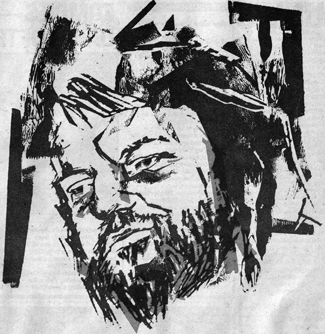| |
|
|
 Strange Fruit Stallin' - New Musical Express - 20th March, 1982 Strange Fruit Stallin' - New Musical Express - 20th March, 1982

ROBERT WYATT

Nothing Can Stop Us
(Rough Trade)

|
ROBERT WYATT's first LP for seven years collects together his quartet of Rough Trade singles and throws in two bonus rarities — 'Born Again Cretin', from the NME C81 cassette, plus a singular, unreleased version of the socialist anthem, 'The Red Flag'.
Though there is little new material here, the LP justifies itself with a cohesion and emotional power that far exceeds those of its constituent singles. On his return to recording in 1980, Wyatt doubted that his passionate concern with world politics could find an effective musical voice — one that worked primarily as music, without compromising his beliefs. 'Nothing Can Stop Us' has, I hope, laid such fears to rest. While the singles explored ways of reaching this fusion, testing musical and political responses in a series of "sketches", the LP's achievement is to integrate their disparate successes into a whole that stands as attractive music as well as being intensely moving.
Of the less-familiar tracks, 'Born Again Cretin' protests the imprisonment of ANC leader Nelson Mandela to an almost Beach Boys-esque richness of vocal harmonies; while Wyatt's treatment of The Red Flag' is both simple and striking, relying chiefly on keyboards and his plaintive, multi-tracked falsetto. The chorus, incidentally, reminds us that the SDP, for all their talk of breaking moulds, have always been skulking around
in one form or other: "Then raise the scarlet standard high/Beneath its folds we'll live and die/Though cowards flinch and traitors sneer/We'll keep the red flag flying here." What was that again - the Socialist Defectors Party?
The remaining songs illustrate Wyatt's global concerns. 'Arauco' is a Chilean folk song that urges the people to stand up for their rights; 'Caimanera' comes from Cuba; Billie Holiday's 'Strange Fruit' mourns the victims of racist lynchings in the American South. Chic's 'At Last I Am Free', which Wyatt chose for its "lovely tune", becomes a fragile assertion of hope to balance the LP's more sombre moments.
|

|
Two tracks are given over to other artists. Dishari, a Bengali band from London's East End, back Wyatt on Ivor Cutler's 'Grass' and also perform their own Trade Union Song', a heady rush of tablas, shenai and impassioned vocals which impart a modern urgency to traditional forms. And Barbados poet Peter Blackman reads his poem 'Stalingrad', complementing Wyatt's a capella version of 'Stalin Wasn't Stallin' ', a garish American propaganda piece from the early '40s, originally sung by the gospelling Golden Gate Jubilee Quartet.
Though I agree with its sentiment, which acknowledges the debt we owe to the Russian people for breaking the back of Nazism, I think 'Stalingrad' is overlong, too formal, and distressingly male-centred in its language. The rest of the LP though, is about flawless: the tunes spare but haunting — a flutter of percussion, bass, keyboards and Wyatt's gentle, affecting vocals.
'Nothing Can Stop Us' bears witness to its maker's compassion and amiable humour as well as illustrating his formidable musical talents. More than that, I'm sure he'd agree, it demonstrates a too-rarely seen communal aspect to music — what Hannah Charlton's sleevenotes call a "cry of humanity" — affirming a common dignity and its own fleeting beauty against the torture and injustice it denounces.
It's also the kind of LP — 40 minutes of pure pleasure — you immediately want to rush out and buy for all your friends. And if I had as many as Robert Wyatt, who's one of the nicest blokes I've met in the music biz, well, I'd be broke before tomorrow.
This record is absolutely right on. Don't stop now, Robert.
Graham Lock |


